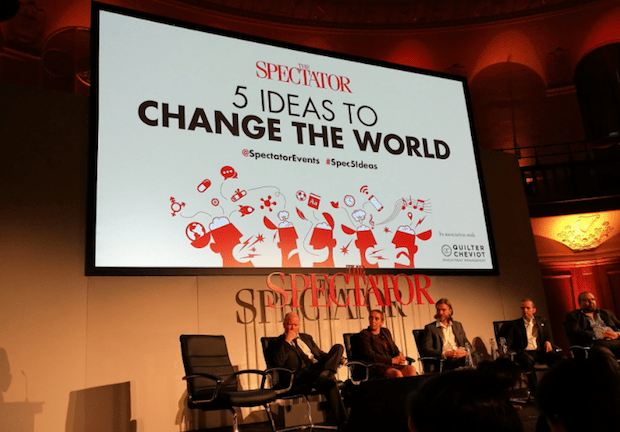How best to challenge the status quo? A week after an election result that surprised just about everyone, today’s best free thinkers descended on Church House, Westminster, to put forward their ideas to change the world.
As Jo Coburn took a night off from BBC politics to chair Spectator Event’s ‘5 ideas to change the world’ in association with Quilter Cheviot, the first speaker Toby Young spoke of his relief to be welcomed on a friendly footing by Coburn – rather than the Daily Politics interrogation he had become accustomed to.
Young’s big idea related to education. The associate editor of The Spectator – and cofounder of three free schools – said its charter schools that hold the secret sauce to successful education. He pointed to the success of ‘no excuses’ charter schools across the pond. These schools receive government funding but operate independently with a formal discipline system. Young said that studies proved that disadvantaged students at these schools, in cities like Boston and Chicago, do as well as their advantaged counterparts.
In the UK, the free school movement is beginning to show signs of the same level of success. The Tauheedul Education Trust (TET) runs a network of primary and secondary schools. Last year, two of its state faith schools topped national tables for the biggest improvement in their pupils’ performance in GCSE exams. These schools are in Blackburn, described by Young as ‘one of the most disadvantaged parts of the country’. The feat is even more impressive when you take into account that while the girls and boys’ schools came first and third retrospectively, the highest performing grammar school was ranked at 17.
Timandra Harkness tackled the issue of ‘big data’, asking: does size matter? She said the rise of big data – which it’s claimed can be used predict human behaviour – effects everyone’s lives daily. While a lot of the time it has a mundane influence, there are more worrying consequences. In America, algorithms are used to try and work out whether people will re-offend, which can dictate jail time. The Radio 4 presenter warned that human nature was complicated and the idea that a big machine with enough data will tell you what’s going on and what will happen, although enticing, is probably wrong.
But as doubt surrounds big data, is another online creation the future? Vinay Gupta asked whether blockchain was the next phase of the internet. Defined as a distributed database that maintains a continuously growing list of ordered records called ‘blocks’, Gupta explained that – although it might sound complicated – a lot of us are already aware of some the products of blockchain. The first major blockchain innovation was bitcoin – an online currency used by millions of people. Almost every major financial institution in the world is now doing blockchain research, with 15pc of banks expected to be using blockchain in 2017.
Meanwhile, with the NHS the subject of much debate and concern over funding, Professor Tony Young said the NHS could – and should – become a Silicon Valley for health. Originally a plumber from Essex, Young is director of innovation for NHS England, where he helps entrepreneurial doctors to come up with new ideas to transform medicine across the world: ‘I pitched that we should launch a clinical entrepreneur programme. We should do what the NHS has never done before which is support our entrepreneurs.’
Young likened the scheme to training ‘a thousand Luke Skywalkers’. One idea to emit from the group of 103 junior doctors is Proximity. The idea is that through a pair of glasses the wearer is presented with an augmented reality which brings a virtual medical assistant who can help assist with surgeries across the world. Another idea to arise from the scheme is ‘Carebnb’, a fostering register for the elderly. This community driven project could help reduce the 4-5 million days a year hospitals lose to bed blocking.
Finally, in a month of yet more political upset, Antonio Mugica pitched an idea to help both engagement and security in politics. The CEO of Smartmatic said the future of democracy is digital. He said that electronic voting was proven to increase engagement and voter turnout – and it’s high time the UK adopted it. By making voting accessible, free from error, fraud and myth, the emergence of new technology will enable new forms of engagement. With another election in the near future looking likely, his idea certainly gave audience members something to chew on in the turbulent months ahead.
We will be returning in the Autumn with another thought-provoking event in association with Quilter Cheviot. Sign-up for the events newsletter here.






Comments